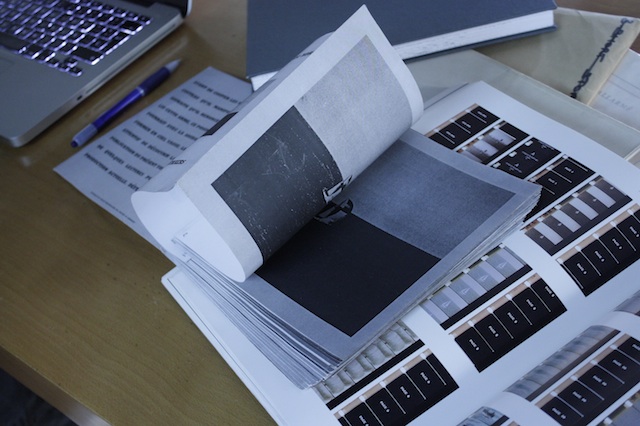Reading sessions, The Book to Come
Open Call for “The Book to Come” Reading Group. Session 1, proposed by Filiep Tacq
by
The Book to Come is a project developed by Bulegoa z/b in collaboration with book designer Filiep Tacq. It is based on five books by Marcel Broodthaers, which the artist conceived as autonomous artworks, and aims to explore the book as a living entity. A book is made up of printed sheets of paper bound into a volume, and is a stable object, not inert matter; something living, a place for producing lived experience. It holds spaces, times and movements waiting to be activated.
The five books the project will take as its starting point are: Pense-Bête (1963-1964), Un coup de dés jamais n´abolira le hazard (1969), MTL (1970-1972), Un voyage on mer du nord (1973) y L’Angelus de Daumier (1975). Each of these touch on aspects of books, such as how they relate to other art forms (sculpture, poetry, exhibitions, film, painting) or the production processes involved in making them (technical, material, institutional, negotiation with others).
The title of the project alludes to a chain of citation. The Book to Come takes its name from a book by Maurice Blanchot from 1959 (Le Livre à venir), which revolves around another book by Stéphane Mallarmé, Un coup de dés jamais n´abolira le hazard (1914). Broodthaers responded to Mallarmé in 1969 with a work by the same title. Jacques Derrida, in his 1997 lecture “The Book to Come” proposed we consider the future of the printed object at a time when technological developments were announcing profound changes in our ways of reading and writing.
Decades later these changes are fully underway, and the project The Book to Come aims to explore the performativity of books. Some of the issues we will consider are the relationship between reading and writing, image and text, matter and the immaterial, the living and the inert. We also wish to question the idea of the future the project refers to: any book is by nature a stable object, perpetually awaited, perpetually awaiting; always to come.
The Book to Come will begin with an eight-session reading group. Sessions will take place once a month from April 2015 to January 2016, and will be proposed by different guests whose readings will relate to the book as a specific medium for artistic practice.
To sign up for the reading group, contact bulegoa@bulegoa.org
A stable group will be set up after this open call.
Session 1, The Book to Come: Five Publications by Marcel Broodthaers. Reading group. Filiep Tacq
I see Marcel Broodthaers’ books not from an art historian’s viewpoint, but from that of a graphic designer who works with artists on their publications. Also from an ‘amateur’ position – highly valued by MB. I have worked over the years on publications by the artist with his wife Maria Gilissen, and discussed them with other admirers.
MB’s work interests me because he uses the different parts of the production process of a book to question the medium through its own limits. There is a lot for an artist or graphic designer to learn from this. MB uses resources from the way a book is made (type of paper, binding, black and white or colour printing, typography) to analyse its possibilities as an art object.
Because of a growing interest in MB’s work, access to his publications, which are mostly held in museum collections, is difficult. This is why I want to talk about them – to open them up again.
Filiep Tacq (Kortrijk, Belgium) has been working as an independent designer since 1984, specialising in books, art catalogues and artist books. He has taught at the Sint-Lucas Instituut, Gante and the Jan van Eyck Academie, Maastricht, and worked on publications by Francys Alÿs, Ibon Aranberri, Marcel Broodthaers, James Coleman, Lili Dujourie, Abbas Kiarostami, Chris Marker, Juan Muñoz, Pedro G. Romero, Michael Snow and Lawrence Weiner; and with institutions including the Fundació Antoni Tàpies, Barcelona; DIA Centre for the Arts, New York; Manifesta 2, Luxembourg; Argos, Brussels; IKON Gallery, Birmingham; Lisson Gallery, London; Guggenheim, New York; MACBA, Barcelona; Museo Nacional Centro de Arte Reina Sofía, Madrid; and Centre Georges Pompidou, Paris.
The project The Book to Come is developed as part of Corpus, network for performance practice. Corpus is Bulegoa z/b (Bilbao), Contemporary Art Centre (Vilnius), KW Institute for Contemporary Art (Berlin), If I Can’t Dance, I Don’t Want To Be Part Of Your Revolution (Amsterdam), Playground (STUK Kunstencentrum & M-Museum, Leuven), and Tate Modern (London): www.corpus-network.org.
Corpus is co-funded by the Creative Europe Programme of the European Union.

